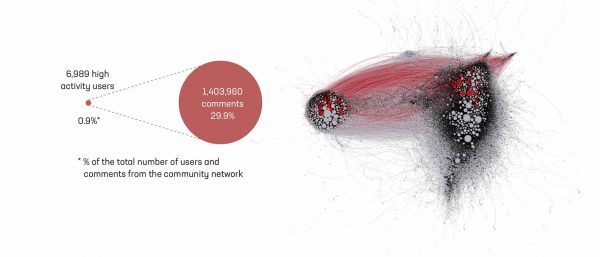Imagine a crowded public square where the residents of a town come to congregate. Within this public square, people buy and sell goods, share stories, gossip, and debate the topics of the day. Now imagine one day, a small, but committed group of residents arrive with megaphones to amplify their message and opinions. They stand up and voice their ideas loudly for all to hear. Soon, their ideas reverberate throughout the whole town. Even residents who cannot see them hear their voices and absorb their messages. Regular debate becomes drowned out, and any attempt to respond is met with a louder megaphone. Soon, the townsfolk become convinced that this is the majority opinion, and since it is so loud, it must represent the consensus and thus, the truth.
Such a phenomenon is currently taking place within our digital public conversation, as revealed by Constella’s latest report titled “COVID, Anti-Vaccine Narratives and Influence Operations in Brazil.” Using alternative platforms like Telegram and WhatsApp, small groups of anomalous users disseminate false public health information and anti-vaccine narratives riddled with patently erroneous medical and scientific claims. They do so on a disproportionate scale, and disrupt the digital public conversation, malignly influencing the debate and shutting out rational dialogue. Examining Brazil, the largest democracy in Latin America, as a case study proved valuable. Brazil’s diverse demographics, active political landscape, and role as a hemispheric power offers a unique glimpse into a digital public debate with significant implications for a global response to Covid-19, and other future crises. The analysis dives into three key findings that illustrate how digital debates related to public health present risks for malign influence operations—and how mapping the digital conversation can yield critical insights into the tactics that enable amplification of malign influence:
1. Communities of users spreading and engaging with vaccine-related disinformation are highly influential across the digital debate.
2. Statistically anomalous users concentrate in an anti-vaccine community and share vaccine-related disinformation with high frequency.
3. Alternative, communications channels—like WhatsApp and Telegram—are effective at distributing anti-vaccine narratives to large audiences across the debate.
Our digital world is rapidly expanding and has now impacted every facet of our lives. Technological innovation like instant messaging, cloud computing, the Internet of Things, and AI have forever changed the way we work, socialize, and do business with one another. Despite innumerable benefits, this transformation has also come with new risks and threats that will require our close attention soon. While hackers, cybercriminals, and phishing attacks pose a danger to business and critical infrastructure, the digital public sphere also faces a unique set of challenges that has implications for how public opinion is formed, critical discourse within liberal democracies, public health communications and responses, and even the priorities on the public agenda.
Debate and skepticism are necessary within a healthy democratic system. However, as shown by Constella’s most recent research, fringe groups and threat actors are weaponizing the debate by sowing extreme levels of skepticism based on falsehoods and disinformation. In this case study, our research demonstrates that 60% of users with extremely high activity are supporting specific narratives and driving activity in the community identified as the Anti-Vaccine Community, due to the type of conversations and content propagated in this cluster of users detected by Constella’s algorithms. These users consisted of just 6,989 accounts, which is only 0.9% of the total users within the network. There remains much work ahead of us as we continue our fight against the spread of Covid-19. However, we must remain vigilant and prepared to mitigate the ongoing “infodemic” as described by the World Health Organization. Instead of germs spreading among a community, small but virulent groups of abnormal activity users are diffusing erroneous content, conspiracy theories, and misinformation to gain influence over a contested public square.








